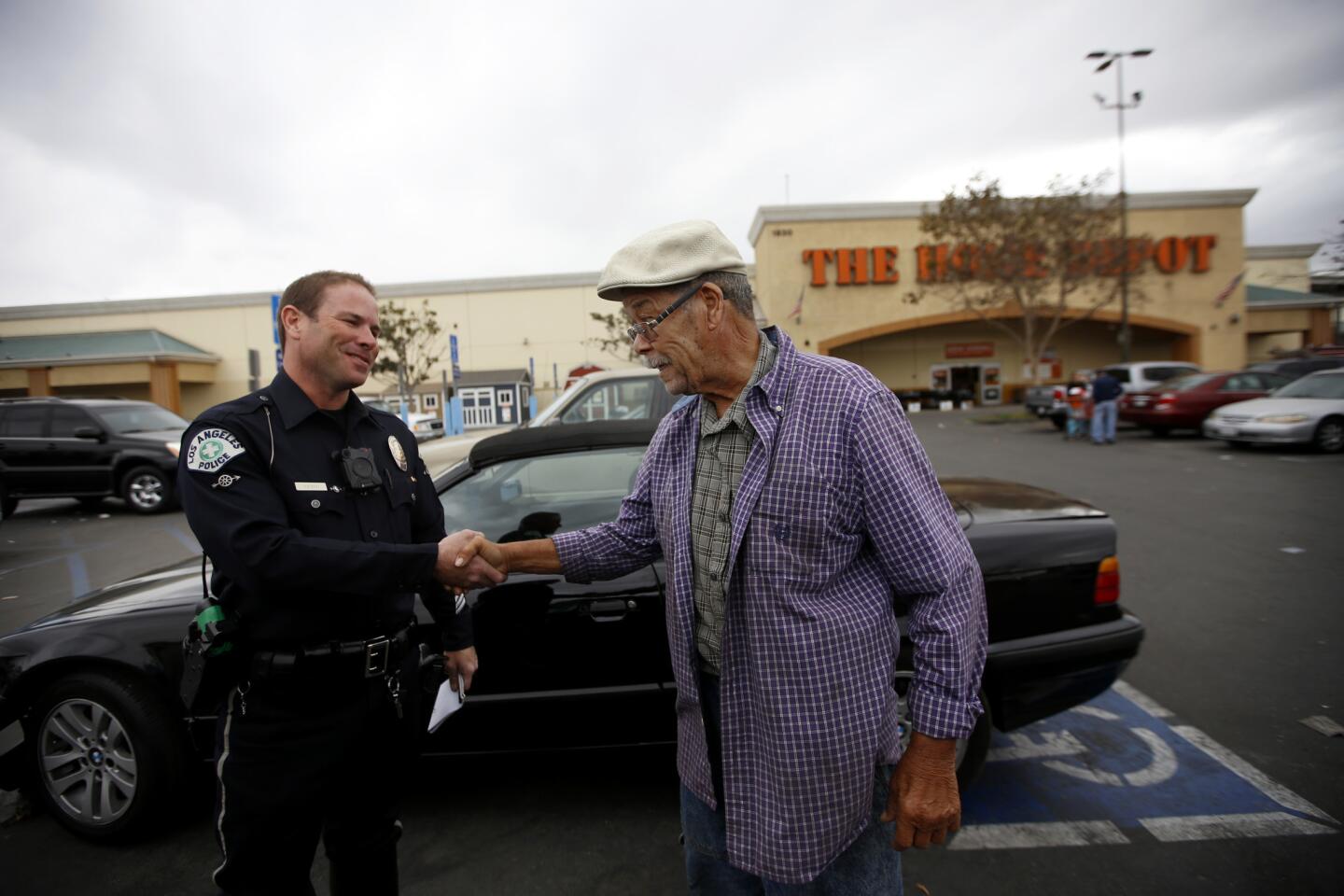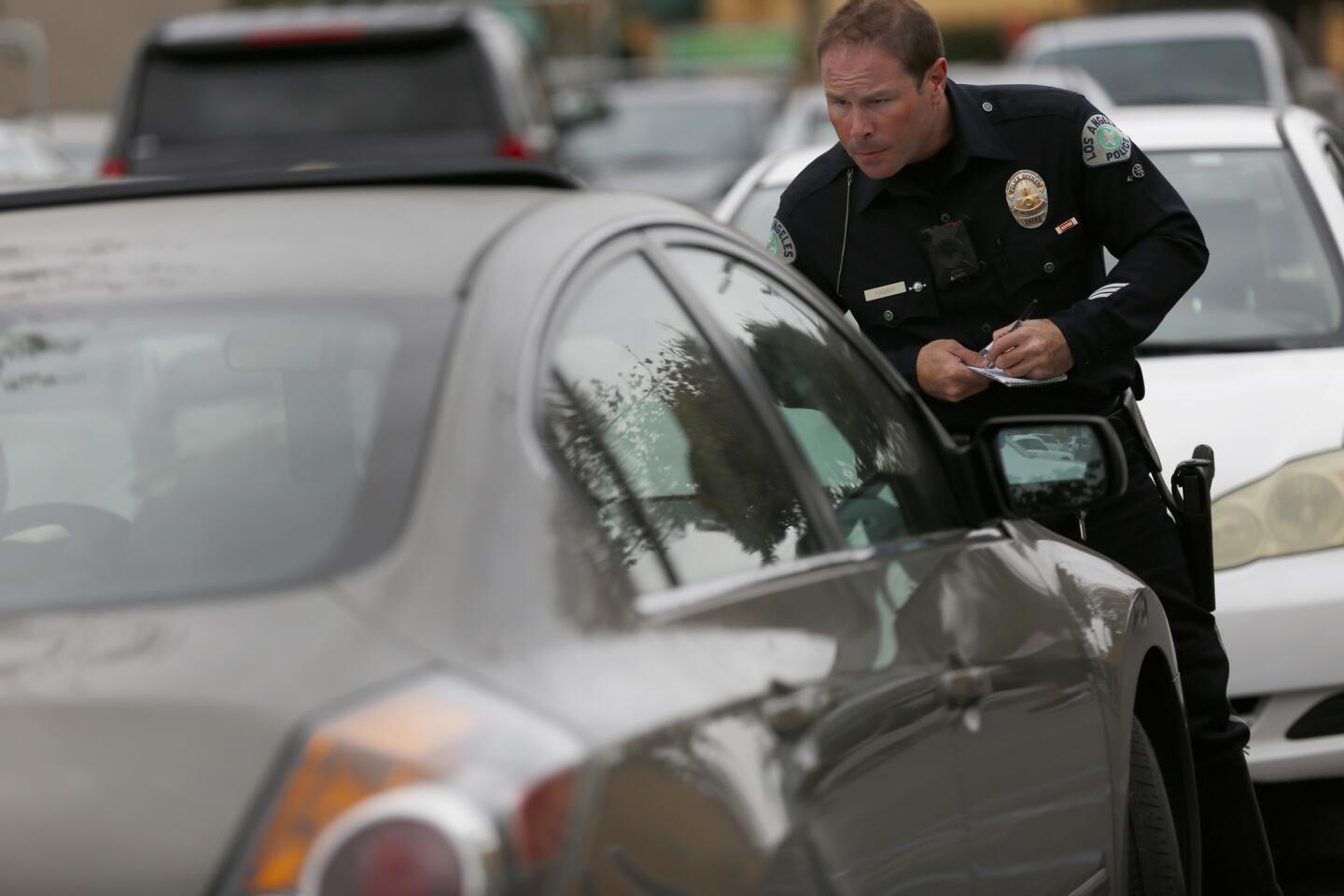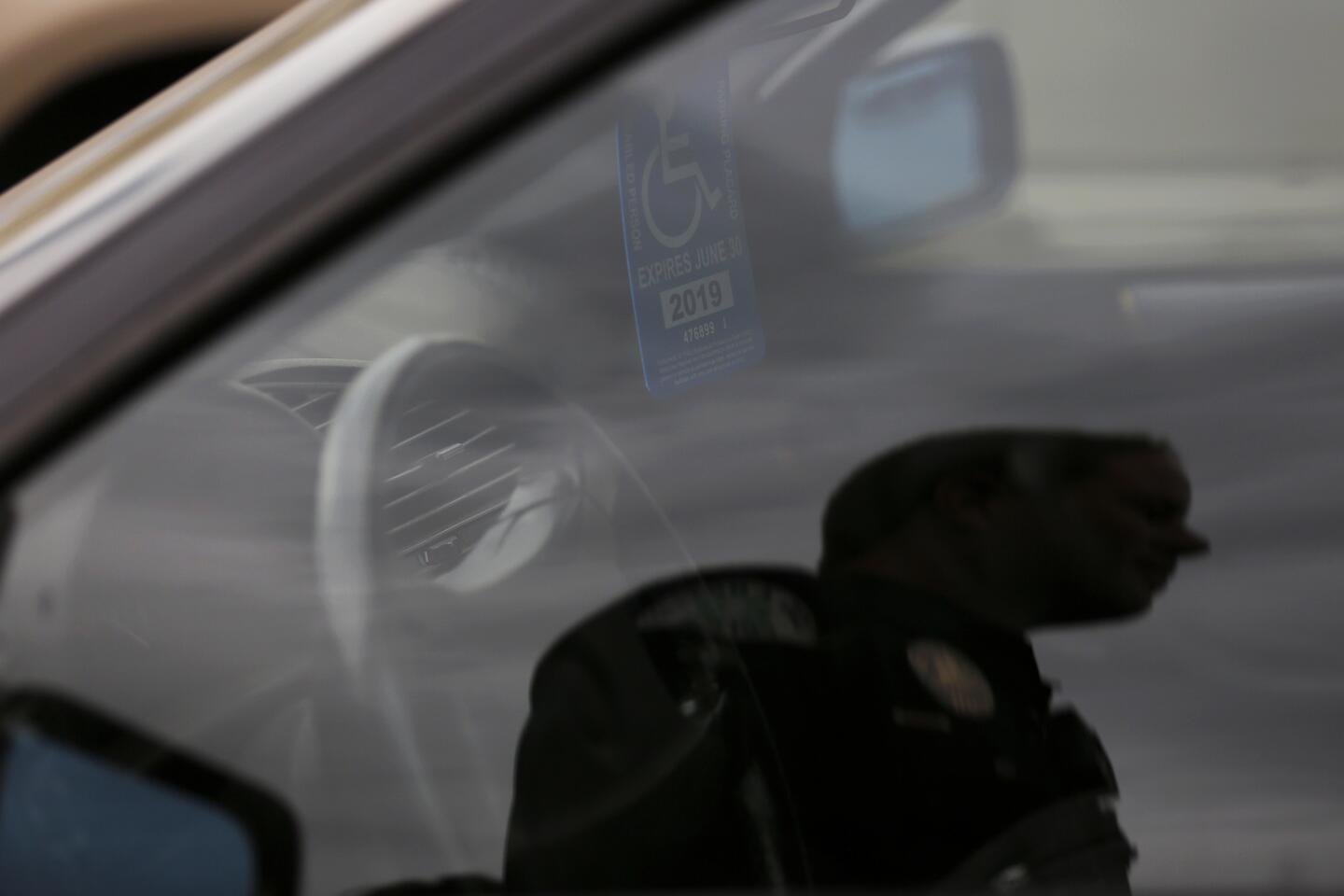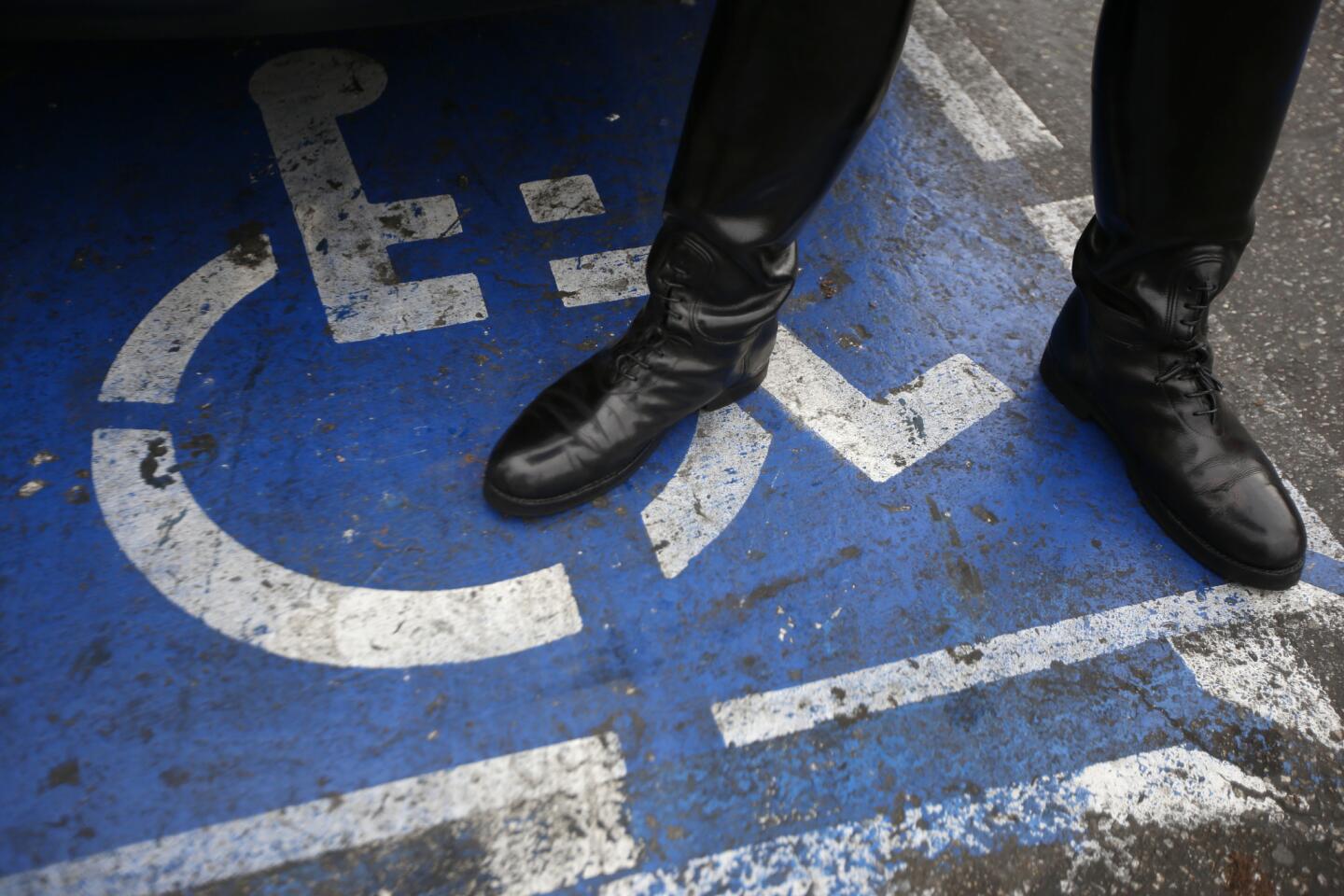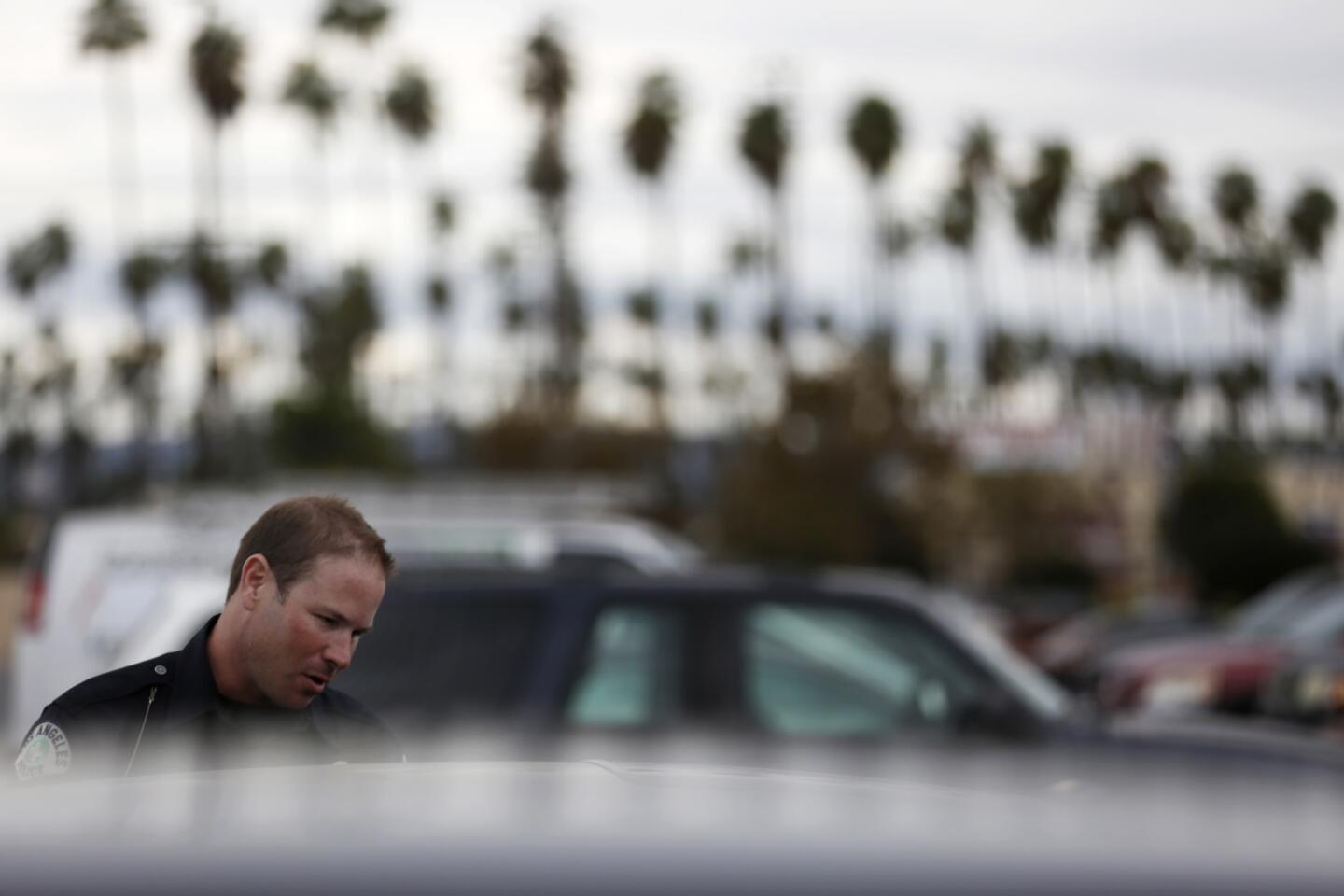Column: It takes a special arrogance to steal a parking place from a disabled person. And this cop is out to bust you
If you have a disabled parking placard in your car, but it was issued to someone who isn’t along for the ride, here’s a tip:
Someone’s watching.
Not every day, not everywhere.
But you run the risk of getting caught and having an extremely bad day.
A couple of weeks ago, I was headed to Tolliver’s barbershop in South L.A. and stopped for a cup of coffee. On my way into a Starbucks in the big shopping center at Western and Slauson avenues, I saw a woman pull into a disabled parking space and begin to exit her car.
Two men in plain clothes flashed badges as they approached the car. One of them asked to see the registration slip that went with the disabled placard that hung from the driver’s rearview mirror.
It turned out that the placard was in the name of her son, but he wasn’t in the car. So the officers confiscated the placard, which her son will have to reapply for, and wrote her a citation.
She argued that it wasn’t fair for detectives to take the placard, but I couldn’t summon much sympathy. For one thing, there were plenty of open spaces nearby, if she’d been willing to walk another 20 or 30 feet. And by taking up the designated disabled space, she was squeezing out someone with a legitimate need.
I asked the driver if she thought that was fair.
“It is and it isn’t,” she said.
Tell it to the judge.
I’ve been on this beat before, and it doesn’t seem as though much has changed. Five years ago, a reader pointed out that on some blocks in downtown Los Angeles, every single car parked at a meter had a disabled placard, day after day. I took a look and found that some of them were parked all day, with the disabled placard serving as a free parking pass.
I waited for drivers to appear, and some of them had no visible disability. Some readers ripped me when that column ran, arguing that not all disabilities are evident.
That’s true, and so is this:
Cheaters are inconsiderate, they’re arrogant, and they’re everywhere.
In 2012, a month after I wrote two columns on the problem, I tagged along on a sting by officers from the L.A. Department of Transportation, and they had no trouble finding drivers with placards issued to someone else. One guy who got a ticket in the jewelry district was so ticked off that he sauntered up, shot me a laser glare and asked if I was happy.
Yeah, I was feeling pretty good.
In South Los Angeles two weeks ago, I spent a couple of hours watching the Department of Motor Vehicles officers fish the parking lot. They came up with one lunker after another as drivers pulled into designated disabled spots in front of Food 4 Less and Home Depot, and parked under signs warning of a $250 fine.

If you have a disabled parking placard in your car, but it was issued to someone who isn’t along for the ride, here’s a tip:Someone’s watching. (Video by Francine Orr / Los Angeles Times)
My advice to abusers is that you might want to think twice about parking just a few feet from an undercover detail and a uniformed officer with the Los Angeles Police Department, hanging a placard, and hopping out of the vehicle in fine form to go haul lumber.
It looks suspicious.
“It’s amazing, isn’t it?” said Ben Yasnyi, the LAPD officer on the scene.
Officers wrote nine citations for placard misuse that day and two more for driving on a suspended or revoked license. Two vehicles were impounded and towed away: one for a fraudulent registration and the other because of a $50,000 warrant on the driver, who was led away in handcuffs.
The DMV officers told me about an operation at the L.A. County Fairgrounds in September, when they could barely keep up with the scoundrels. A DMV spokesman in Sacramento confirmed that officers wrote 477 citations to fair-goers for placard abuse. The DMV citations are misdemeanors and can run anywhere from $250 to $1,000. That’s an expensive trip to the fair, and it doesn’t cover the deep-fried Twinkies.
I went back to South L.A. last week to watch Officer Yasnyi cruise the same lot, working on his own, as he usually does, rather than with DMV. He’s been on the force 16 years, focused on nabbing drunk drivers most of that time, but he switched to disabled placards a couple of years ago when he noticed that people with serious disabilities were having trouble finding parking spaces.
Yasnyi approaches drivers and asks to see the registration for their placards, explaining that he’s making sure disabled people don’t get pushed out of prime spaces by impostors. He guesses that about 30% of the time, the placard is stolen, altered or issued to someone else, not necessarily among the living.
“Unfortunately, that’s common,” Yasnyi said of the dead-relative scam.
When he pulls out his ticket book, some of the people take their medicine well, some shrug, some have an attitude, and some ask if they can keep the car where it is while they do their shopping.
Last week, a woman pulled her van into a disabled spot with a placard issued to her mother, who was not in the car. Yasnyi has the option to write a misdemeanor citation, but said he usually writes parking tickets because that won’t appear on the driver’s record.
Still, the penalty is stiff.
Yasnyi and L.A. Department of Transportation officers write two tickets that can run $363 each, such as the case involving the woman in the van. One for improper use of a placard, and one for illegally occupying the space. And the placard is confiscated too.
The driver of the van complained, out of Yasnyi’s earshot, that writing tickets like this might make people rob and steal to pay the fine. Her young son asked Yasnyi why he was “messing with black people.”
“That’s not what it is,” Yasnyi told him. “I’m out here making sure that people who are handicapped have a place to park.”
At a recent USC football game, Yasnyi came upon three groups of fans parked in disabled spots with illegal placards. He wrote citations for two of them, putting a damper on their pre-game tailgate parties. The third vehicle had an altered temporary placard, with beads hanging from the mirror to hide the change. The drivers had already gone to the game, and they would return to an empty space. Yasnyi had that vehicle towed.
On both days I spent with the officer, people approached to offer thanks. Yasnyi’s supervisor, Sgt. William McDonald, said it’s not common for citizens to send in commendations, but Yasnyi gets a dozen or more a year.
“I can’t hardly walk,” said James Earls, 78, who has a placard but told me he’s seen drivers take up disabled spots and run into stores. “I appreciate him doing this.”
Yasnyi said officers in other parts of Los Angeles are on the same detail. They can’t be everywhere on every day.
But there’s always a chance someone’s watching.
Get more of Steve Lopez’s work and follow him on Twitter @LATstevelopez
MORE FROM STEVE LOPEZ
Neither bills nor advancing age can dim the glow of a drummer’s dream
What if this homeless woman were your mother — would you keep moving or step in to help?
As renters struggle to pay the bills, landlords and speculators cash in
More to Read
Sign up for Essential California
The most important California stories and recommendations in your inbox every morning.
You may occasionally receive promotional content from the Los Angeles Times.
